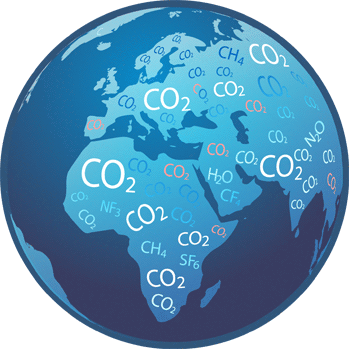
Did you know that the Earth’s
average temperature is rising about 0.2℃
per decade (World of Change)? This may not seem like a very dramatic change,
but to those concerned about global warm, it is, and you should be too. There
are numerous environmental problems that have been affecting the quality of our
environment. Some the problems include pollutants from mining, loss of natural
resources, and our own carbon footprints.
All these problems cause an increase in CO2 emissions, greenhouse gases,
and an overall climate change.
Carbon dioxide emissions are a
huge aspect that results in global warming. There are two types of carbon
cycles, the fast carbon cycle and the slow. The slow carbon cycle consists of
carbon dioxide cycling between rocks, oceans, and soil over millions of
years. The fast carbon cycle refers the
cycling of carbon dioxide between plants and respiration. Much of the carbon
dioxide we produce comes from the burning fossil fuels or plant material. When we burn fossil fuels such as driving a
vehicle, mining coal, or heating a house, carbon dioxide gases are moved from
the slow carbon cycle to the fast carbon cycle and the carbon gets released
into the atmosphere (“The Carbon Cycle”).
This increase in carbon dioxide and
greenhouse gases trap heat for the Earth to absorb. The energy from the sun
radiates heat on the Earth and some of the rays are reflected into space, but
with the increase of gases, the amount of energy absorbed by the Earth
increases and the amount reflected into space decreases. The energy the Earth
receive must be equal to the energy the Earth is reflecting into space or the
Earth will become warmer or colder (“The Carbon Cycle”).
One way to can see how much each
product we use effects the environment is by doing a Life Cycle Assessment
(LCA) of each product we use. An LCA allows for consumers to make an eco-friendly
decision by comparing the environmental impact of different products. An LCA quantifies
the impact of a products life from “Cradle to Grave” (“Cradle-to-Grave
Assessment”). This expression refers to
everything used to make and transport the product including the extraction of
the raw materials through the way it was recycled or disposed at the end of its
life. Many companies use LCA to help
with marketing, reduce environmental impacts, and evaluating policy
regulations.
Furthermore, we can assess each of
our environmental impacts by evaluating our own carbon footprints. Your carbon
footprint is a measurement your direct and indirect total greenhouse gas
emission produced (Carbon Footprinting). Understanding your carbon footprint can help
your figure out what areas your can change to help environmental problems. Maybe a change you could make would be riding
a bike rather than driving your vehicle to work. Maybe you could hang dry
clothes rather than using a dryer to save electricity. These are all things that impact your carbon
footprint.
Overall, global warming is a real
issue. It may not seem like a
significant number, but over the years, this small number adds up. This small
change affects the growth of plants, animals, and ecosystem that humans are not
aware of. We need to be more aware of
our effects on the environment. A good
way to start being aware of our environmental impact is to understand our
carbon footprint and compare the LCA of products we buy to find the best
eco-friendly option.
“The Carbon Cycle.” NASA, NASA, https://earthobservatory.nasa.gov/features/CarbonCycle/page5.php.
“Carbon Footprinting Guide: Resources & Guides: Carbon
Trust.” Carbon Footprinting Guide | Resources & Guides | Carbon
Trust,
https://www.carbontrust.com/resources/guides/carbon-footprinting-and-reporting/carbon-footprinting/.
“Cradle-to-Grave Assessment.” Cradle-to-Grave Assessment
- an Overview | ScienceDirect Topics, https://www.sciencedirect.com/topics/engineering/cradle-to-grave-assessment.
“World of Change: Global Temperatures.” NASA,
NASA, https://earthobservatory.nasa.gov/world-of-change/DecadalTemp.